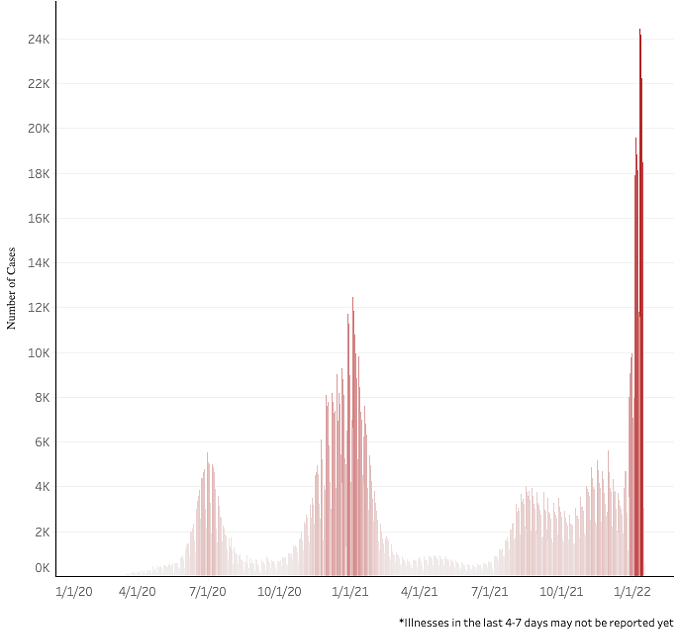More than 25,000 Arizonans have now died after contracting COVID-19.
The virus has killed 25,212 people as of Monday, Jan. 16, including 3,304 in Pima County, according to the Arizona Department of Health Services.
The grim milestone came the same week the state recorded more cases than any other week in the pandemic, including a single-day record of 20,257 on Saturday, Jan. 15, as the Omicron variant continued to rapidly spread across the state.
As of Jan. 13, 17,528 COVID cases had been reported in Pima County since the start of the new year, according to Pima County Acting Administrator Jan Lesher. That’s more than were reported in the entire month of December, which saw 14,753 cases. As of last week, COVID patients were filling roughly one-third of all ICU beds and only seven beds were available across Pima County. Local schools saw 555 cases last week, with students making up about 85% of cases.
Dr. Joe Gerald, an epidemiologist who has been tracking the pandemic since it first arrived in Arizona nearly two years ago, noted in his weekly report that for the week ending Jan. 9, at least 108,783 Arizonans tested positive for COVID, a 104% increase of the 53,207 cases reported in the prior week. Gerald said the number “substantially undercounts the true toll, as there are two to three undiagnosed cases for every one we know about.”
Given that cases are doubling weekly, Gerald predicted that one in 10 Arizonans would likely be infected with COVID this week and one in four would have the illness in the month on January.
He noted that rates were highest among people between the ages of 15 and 24, with 2,342 cases per 100,000 population, and lowest among those 65 and older, with 711 cases per 100,000.
Roughly one-third of Arizona’s 8,763 general ward beds were occupied by COVID patients and just 446 beds remained available for use as of Jan. 13. Intensive care units are facing greater pressure as well, with with 630 of those beds (or 38% of the state’s total) now occupied by COVID patients and just 75 ICU beds available statewide.
To make matters worse at hospitals, healthcare workers are contracting the virus, leading to staffing crunches at hospitals.
As a result of the staffing crunch, some Banner Health urgent care locations are closed, causing longer wait times at other urgent care facilities, according to Dr. Marjorie Bessel, Banner Health chief clinical officer, who gave a media briefing on Tuesday, Jan. 11.
Banner is following the crisis CDC guidelines when allowing health care workers to return to work after being infected with the COVID virus. All healthcare workers have to remain out of the workplace for five days from the date of their positive tests and are screened for symptoms before returning to work process. Individuals that are asymptomatic and mildly symptomatic may return to work.
In addition, Banner is using outside contracted workers at its hospitals during this surge to compensate for the staffing shortage.
With crowded emergency rooms and long waits, Bessel asked Arizonans to consider primary care doctors and urgent care clinics for non-emergency needs.
She also urged Arizonans to get vaccinated and receive a booster shot because it’s “the best way to prevent serious COVID illness that requires hospital level care.” She also said people should mask up when indoors (preferably with a fitted KN95 mask), stay home when feeling sick and to get tested when experiencing symptoms.
COVID treatment options remain limited. Sotrovimab, a monoclonal antibody treatment for those who test positive, is in short supply and will require a doctor’s recommendation for patients. Due to limited supply, not all eligible patients will receive the treatment.
Oral antivirals such as paxlovid and molnupiravir, which have received emergency use authorization by the FDA for patients that meet the clinical requirements, are also in limited supply and are being distributed to roughly 32 retail pharmacies across the state. These medications also require a referral.
Bessel said Omicron has yet to peak but she predicted it will be in weeks to come based on how the virus has behaved in other countries, where the descent of the variant has been just as rapid as its spread.
Meanwhile, Northwest Healthcare announced last week that it was once again admitting cardiac patients at Oro Valley Hospital. Northwest Healthcare had redirect ambulances with cardiac patients to other hospitals because of staffing shortages.








